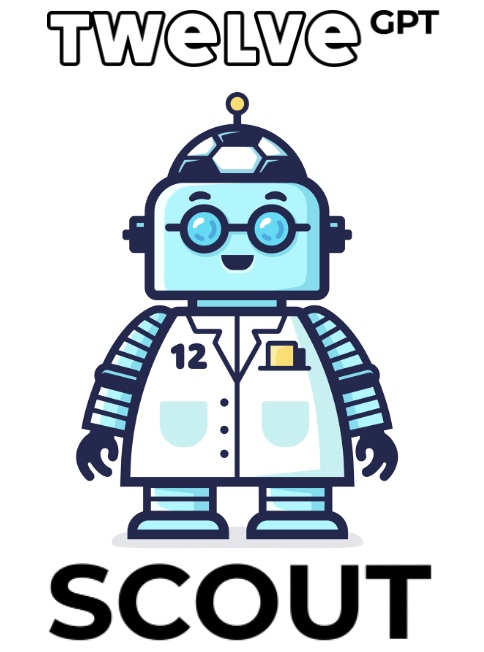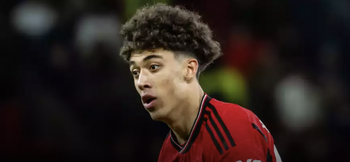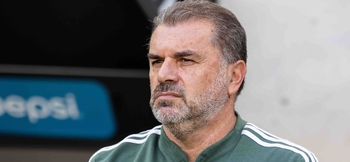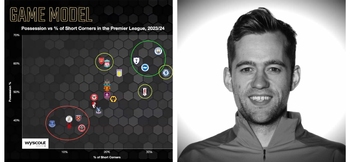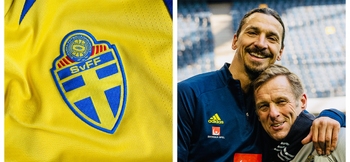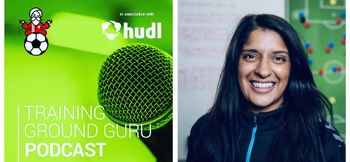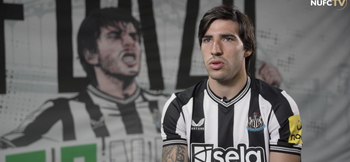TGG Podcast #62 & #63: Rene Maric - From blogging to Bayern Munich
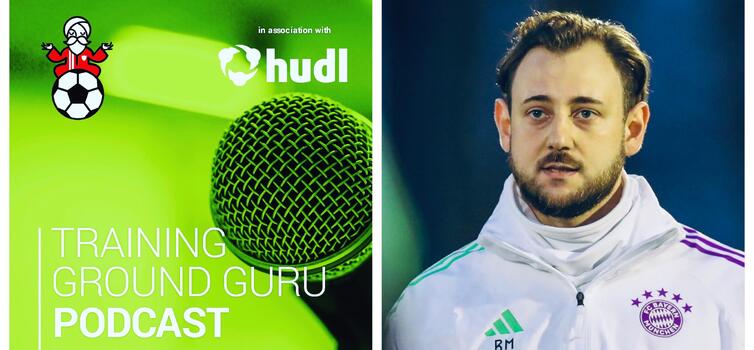
Rene Maric is Head of Coach Development and Playing Philosophy at Bayern Munich and has a huge amount of coaching experience under his belt at the age of just 31
Written by Training Ground Guru — March 25, 2024
RENE MARIC is one of the most exciting young coaches in Europe.
The 31-year-old Austrian is currently Head of Coach Development and Playing Philosophy at Bayern Munich and has been coaching at elite level for a decade. He made his name producing the cult tactics blog Spielverlagerung, before getting a job with Red Bull Salzburg Under-19s.
That was where he teamed up with Marco Rose and the duo went on to work together with Red Bull's first team and at Borussia Monchengladbach and Borussia Dortmund. Since then, Maric worked as Assistant Manager at Leeds United before taking his current role with Bayern Munich last November.
You can listen to this episode below and read an edited transcript after that.
1. SPIELVERLAGERUNG (2011-2016)
Rene Maric: I was an amateur youth coach, taking the Under-11s, and after school I was in the Austrian Army for a few months. Spielverlagerung started out as a way of writing things down to be able to feedback to ourselves and others. I was doing things on the pitch and also things in a more theoretical academic way and trying to make that difference smaller and smaller through more understanding.
If you cannot explain it simple enough, then you maybe don't understand it fully. Spielverlagerung - it just means switch of play or also changing the game in some way - we thought back then that people would not really be interested.
We wrote theory articles, match analysis, team analysis, just whatever we thought was interesting for readers, just to delve more into the game and to get feedback and meet people. Some of the guys who wrote for it were readers.
When we saw that people were interested, we went into more detail and more discussions. From that, I think it developed and was having a small hype back then. People were quoting it in the German media; some coaches, some players mentioned it, so we got a niche and following. From that, the amount of readers got bigger and we got some consultancy projects.
I wrote a book with another guy who was a guest writer on the blog. These consultancy projects and networking and meeting different coaches really helped me. You could say it was surprising, because we were just some young coaches talking about the game.
2. THOMAS TUCHEL REACHES OUT
We met, I think, 12 years ago, for the first time. He had read analysis from a Mainz game against Bayern on our blog. He seemed to like it, find it interesting, and think that it was pretty accurate; that's what he said. Then his staff reached out to us by email, invited us in, and when we met, he was also sitting at the table.
We were just talking for a bit and then they showed us around the stadium, discussed some training, some games, some teams, and some opinions. We had a great experience. For us, it was a really big thing. I had a very small consultancy with the staff of Mainz for just over a season.
It was the first time that I really had the feeling that these things I was thinking about also happened at the top level in a similar manner. I am obviously grateful that he gave me a confirmation of some things and then the motivation to continue. Especially back then, and even now, he is a big role model for a lot of coaches in the German-speaking countries because of his background.
It was really nice and a great thing for him to reach out to us.
3. JOINING RED BULL SALZBURG (2016)
When I went to Salzburg (in 2016), I stopped writing, because of conflict of interest and also time issues. The club was open that I could do it, but I just focused on being on the pitch. I signed a full-time contract as the Assistant Manager of the Under-18s. We also had the U19s in the Youth League and the U17s.
Obviously it had helped me, because I met Marco (Rose) through it and got the job in some way because of that. Marco was a former player of Thomas' (Tuchel, at Mainz), and he heard of the blog and me.
It was just a lucky coincidence that he was coaching at Salzburg and I was studying there (at the University of Salzburg) and had my amateur team there. We met and started to talk football.
From there, after a few months of talking, he was open to me becoming his Assistant Coach. It helped me a lot, because I probably would still be coaching in amateur football instead of having experienced Premier League and Champions League.
I think I liked him more at the start than he liked me, which is just fine. He's a bit older than me, I think exactly 16 years older. And I think in terms of our backgrounds, he came from the club school of thought and is a great man-manager.
With the blog and even more with my amateur team, I had had to create my own idea from scratch. Then it is very authentic and it stayed the same until today in its core. But you make a lot of mistakes.
From there, we started to discuss some ideas, convert some ideas, to discuss some ideas. It was great for me to get a mirror, to get feedback from someone who had a different type of experience. I was also able to give him some feedback and new input. Always having that idea, 'Okay, I'm here to give some different type of input and create some different type of output.'
Sometimes he would just say, 'No,' and very often he was also right. It was a really enjoyable time and I hope that he also learned something. Obviously, I learned a lot of things, mainly because he allowed me to do so much: to do meetings in front of the team, to do individual meetings without him, to be part of individual talks which are not just content but about leadership and management.
To be part of that helped me so much. I'm really grateful, because I think it's not usual that as a very young Assistant Coach, you're more or less taking on the journey fully. He gave me experience that you cannot get easily and quickly normally.
We won the Youth League in our first season with the U18s and then to the senior side. I was 23 years old. We played in the Europa League semi-finals, won the title the next year, won the Double, and again played in the Europa League against some great teams. For instance, (Simon) Inzaghi's Lazio was something that really stayed with me.
I had so many great players. It started with the U18s (at Salzburg), where I had (Dominik) Szoboszlai. Then you have some players that are maybe not as famous but are really tied to my heart because of their character, the experience we had, the bond we created.
I'm not surprised (at Szoboszlai's success), because we always knew that he was a tremendous talent and it's just up to him how consistently he's able to apply it. When I saw him develop from when he was 16-years-old to the later stages when he was joining us in the first team at Salzburg. You could see that there's unbelievable potential.
In terms of shooting, he's maybe the best in the world, or at least up there. He has that ability, that capacity; he's a tremendous player.
4. WHAT DO YOU THINK ABOUT COACHES BEING ACTIVE ON SOCIAL MEDIA?
It sounds strange, but I'm a bit more of an old school guy to be honest. I have social media for the sake of being informed, but I'm a passive consumer. I use social media because you have the chance to get a good bubble where you can find a lot of information on different topics; you can follow people who have an academic background on skill acquisition; you can follow coaches, you can follow analysts, you can follow blogs, you can follow whatever. So that's really really interesting.
I prefer being in the meeting room or on the pitch or in the office, because that's where the actual work is done, not on social media. Writing articles is like a mirror, it humbles you, because sometimes you write stupid stuff or think you have more in your head than you actually do. Sometimes I'm embarrassed how long it took, but I think it was helpful in putting my thoughts down, making them clearer and more concise, and then being critical about them.
That was something that helped me to to improve. Even today, I like to film meetings if possible and then revise them. That openness and that way of thinking about myself is probably the thing that stayed the most with me from that time.
5. RED BULL PHILOSOPHY
I started to be a coach before the Red Bull style became the Red Bull style. Obviously, it existed before, with Ralf Ragnick and with his mentor Helmut Groß. The way it is now, you could say it's 10 years with Roger Schmidt and the Red Bull Salzburg development .
I was already a coach and had my own ideas and they were shaped very much by some players I liked and some coaches I liked, like Pep Guardiola and Jurgen Klopp. Obviously you look at them and you look at their teams and like, 'I would like my team to play like this' and then trying to find a way to to apply this on amateur and youth and adult level.
Then I went to Red Bull and got a more professional way of talking about the game, especially the transition phases. It helped me a lot in terms of improving things that I probably would not have looked at in that way back then.
It helped me so much in getting a clear structure in these things and adapting my way on the knowledge and experience they had gathered over all these years. But in the end, I think everyone has to have their own idea. Some convictions have to stay with you, because they are the core beliefs of how you see the game.
It's a general point in life: if you have a principle, then your process can follow easier. If you have a reference, then you have something that is a target to strive for, a goal to achieve, and I think that makes you clear about which intention you should have. That helps you to have the right behaviours and, in the end, it's identity, it's culture.
That identity and culture that helps you align all the processes in a club. The Red Bull style is to attack at all times: to be on the front foot, pressing very early, trying to progress play with the ball very quickly, being very high up the pitch.
Obviously, a lot of teams try to press. I think what Red Bull does a bit stronger and more than others is how they do it together, how extreme they do it, how they try to create an overload on the ball not just around the ball, but literally on the ball, to create a two against one situation for the ball carrier to win the ball.
There were teams that pressed very high, very well in the history of the game. You can mention Sacchi's Milan, (Valeriy) Lobanovskyi (with Dynamo Kyiv), who maybe did it a bit deeper, but very co-ordinated, the Netherlands and Ajax under (Rinus) Michels.
The way Red Bull do it is a bit more extreme, more structured. That's what makes them unique, and that's probably how I describe them, this type of extreme you press, putting pressure on early, how many players they use, how focused they are on that phase of play.
6. BORUSSIA MONCHENGLADBACH (2019-2021)
Gladbach is a club that I really like and the people there stay in my heart. We adapted to Gladbach and to their culture. We tried to mix some of these things, thinking of what is non-negotiable for top-level with the stuff that you could say is like the heritage of Gladbach as a club, with Jupp Heynckes in the far past and Lucien Favre in the near past.
We had a great one-and-a-half years there. Obviously, we didn't end the season as well as we wanted to, and we left to Dortmund, where I really saw some amazing players. Every club was different. Every club was something that I can take pride in working there, and where I learned a lot and where I saw things in a different light and from a different perspective.
7. BEING CALLED A LAPTOP COACH
Honestly, all these cliches, I don't care. If they want to call me like that, it would be pretty stupid to nowadays if you do not use a laptop because it makes things much easier, especially if you have to organise a lot of stuff.
Right now, as a U19s coach, it would be pretty hard without a laptop to make it work; there would be a lot of paperwork and would be pretty hard. But if people want to use it in any way, they can do it. It's a pretty good tool, just like the cones on the pitch are a pretty good tool. The laptop in the office is also a pretty good tool.
8. BORUSSIA DORTMUND (2021/22): WORKING WITH HAALAND AND BELLINGHAM
Haaland and Bellingham, I really had a good bond with, a great relationship on the pitch with, working individually with them, talking with them, learning from them too. Because obviously you can learn from these types of players. They are great personalities and amazing world-class players who are also very popular.
The main reason they (Dortmund) are able to get the top talents is because it's a big club with a big fan base. It's very attractive for the top talents. If you have that mixture of being a big club and still being able to give consistent minutes and promise he'll be able to play, I think that just convinces these top talents to go there.
If you give the minutes, very often if there is enough support from the staff, these players will progress through these games because they're high-level games in a high-level environment. That's the main part of it.
When Erling was at Salzburg, you do a lot of individual training because he came with a not-so-simple injury to us, which didn't permit him to go 100% in the first weeks and months. So I had the pleasure that I was taking over in these days where he had to do it without the team or where he couldn't play. That was really enjoyable.
I always believe that if the player has a wish and a conviction that he wants to improve, it's always very good to listen to their thoughts and try to help them in what they want to be better at.With Erling, we did a lot of movement in the gaps of a back four in different situations of the game, depending on where the ball is.
If you look at his games, maybe the easiest example is if the ball is in the right half-space of a player like (Kevin) De Bruyne. What's the best position and angle to receive a ball? What happens if the ball moves, and then you have to relocate? What happens if the ball breaks through? What is the type of run? What are the reference points for your perception?
I've never seen someone who is as quick a learner as Erling. The way he adapts these things from the training to the game and the understanding of these things is very underrated and a hidden quality from him, because he's always described as this very physical striker. He's a very smart guy.
I think if you have a father who keeps you on the right path, if you have that character he has. He was not an early bloomer, from what I gathered. If you stay at your hometown club, if you have that eagerness to improve, I think that comes with it.
Obviously, I met his father, I know him, and I think that in terms of the family, the whole environment, his character, the character surrounding him, that was very helpful to make him who he is today. You can always look for improvements, but in the end, he's the same guy as he was when I met him years ago.
That eagerness to improve, to win, to work on yourself without changing yourself – that mixture is something that I think really connects them (Bellingham and Haaland). It's an honour to work with players like this.
9. LEEDS UNITED (2022/2023)
We left Dortmund at the end of the season (2021/22). I've never met Jesse (Marsch) before, but he was our successor at Red Bull Salzburg. I think he saw some of the work that we did before. I guess he liked it, and he probably also heard that I was always trying to give new ideas and feedback and criticism to Marco.
When I was free and he needed an Assistant Manager, it was probably easy to get my number and to reach out. We talked for some weeks in terms of the journey, the alignment. In the end, I thought Leeds is such a big club in the Premier League, the biggest league in the world, so why not try something else?
See a different Head Coach, get experience in the best league against the best opponents in the world? Leeds is a huge club, I really like the fans, but also the people there, the staff and the players. It's amazing. I think what (Marcelo) Bielsa left there in terms of that eagerness to work, to be able to take over from that, to be able to become part of that culture and learn from it was something that I really don't take for granted.
Statistically, from what I've gathered, like the running data from Jesse's teams and Marcelo's teams, the speed of play in both phases, that eagerness to press high, the transition, looked very, very similar. For Victor, from what he told me, that was like a natural fit.
Also, having a young squad, the idea was to have a coach who had a track record of developing talent. In the end, in terms of why it didn't work out, it's not easy to say. There are things that you can say, like the expected goals numbers were better than the rest showed. In terms of the absolute amount of running and sprinting, we were still top three in the league.
I think only three clubs had a positive net spend - Leicester, Leeds and Manchester City. City won everything and Leeds and Leicester got relegated. But, in the end, you can always use these things as factors and try to explain stuff.
But it didn't work out. I can just talk about myself, and I'm quite honest. There are things that, in retrospect, I would like to have done better. I did try, obviously, to do my best. I wasn't able to do that. In the end, after I got fired, I went to the next two games and was in the stand. I met some great people and still keep in touch with some of them.
In that period, there was also some turmoil in terms of the high-ups; it's just normal if you're selling a club, if you're in the process, every decision has an additional point of discussion. Do you want to do it now? Do you do it later? And then things can get slower. That's normal. That's part of the situation and not necessarily the people.
It's just sad that, in the end, such a historically big club with a great fan base couldn't make it through the season. I'm still very disappointed. I track every result. I was in touch with the new coaching staff, giving some feedback, ideas, and wishing them luck. And I think they're doing a great job for a great team.
The football culture is amazing there (in England). I think it's very important and very helpful that I've learned some things when I was there. Because I think if you come to a club, country, whatever, you have to adapt to it. You have to understand the culture, you have to adapt to it.
And then, obviously, from understanding that, you can try to have success with your way. The Premier League is the biggest league in the world and the Championship is such a great league with so many different teams. It's just a great challenge.
10. BAYERN MUNICH (NOVEMBER 2023)
This is a very big club for me. For me personally, it's the biggest in the world, because I was born and raised near Munich, and I'm a big fan myself. The role here is basically trying to develop the methodology, so coach development. In German, they call it team lead, but I would probably translate it to Head of Coaching Methodology.
Coach development is one big thing, to create a clear picture of what we want to be as a club. That's the playing idea part, a red thread that goes from the First Team to the U11s. We have a really good structure, a lot of good people, and we also have a lot of content.
What I'm doing currently is going through the best games of Bayern Munich historically and trying to find some things that are connecting all these different players and teams and coaches through all these years and creating some things that you could call non-negotiables in terms of our playing idea.
And maybe also find these things we do not want to have. The role hasn't existed before. I do believe and hope it will exist after me and they will continue it. I think it's generally a good role because the coaches can connect with someone, they can share experiences, there's a person who can collect all the knowledge and the content that's going in and out of the club that can create some basic playing idea mythology as a reference.
The first thing I told them in our first meeting is I do not want them to be copy-paste from anyone; they should be themselves. There are some things that are important that should be visible in their training and in their games and in the player development, but the way they achieve that, the way they work, is obviously always dependent on their individual qualities.
I told them I want them to be authentic, to be themselves, and to become the best possible version of themselves while still maintaining some of these basic principles. Implicitly, it already exists through all these years that a Bayern team should be recognisable. So that's part of me identifying that and also adapting it to what top-level football, modern football, needs right now to be successful and then translating that to the different age groups in different training situations, game situations.
I'm going through all of the content that is existing at the club and then, in the end, will create the most compact and shortest playbook that you can create, because we just want to give them a sharp direction. As a coach you should be able to express yourself just like a player. Everyone can choose the way they want to go as long as they follow the same direction.
I'm a big believer in allowing people to work authentically and helping them to become better in the way they do it. But, obviously, they have to follow that direction that the club wants. And then it needs to develop players and to develop teams where you can see an underlying style and a Bayern Munich badge on the heart.
I'm also the Head Coach of our U19s and the Youth League team. Our Youth League team is our actual U19s, and our U19s is basically an U18s team. Half of the squad is U17 players.
The first half against Basel with our U19s (on February 7th, which Bayern won 2-0) was what I want them to play like, because that is the Bayern Munich way. In the second half, they showed what happens if the coach is not able to help as much as he should. It took me too long to make the change in that game. Normally, I don't like to do these changes anyway, as I think they have to figure out solutions by themselves, and I'm just supporting them.
But in that game, with these circumstances, maybe I could have helped them more, so I told them that I'm thankful that they reacted really well in terms of if things are not working as they should, they did a great job. They ran 15km more than in the game before, which is an unheard of statistic. It's the players showing that they wanted to win the game and I really, really appreciate it.
11. HOW WOULD YOU DESCRIBE THE BAYERN MUNICH IDENTITY?
We always want to be the dominant team. We always want to be minimising space for the opposition when they have the ball and maximise it when we have it. We want to have players who can do that individually, we want to have a structure and then coaching points where the players can learn to do that and do it as a team to be able to dominate in all these four phases.
Nowadays, everyone is saying that, but I really want the players and the coaches to be fairly extreme and very brave in terms of doing that. I want them to be able to play under pressure, keep the ball, and when we don't have the ball, get it back quickly.
And then there's some more detailed things, the way we want to achieve that in terms of the passes that we choose, the positions that we will need. You have specific zones where we really need technical quality in terms of being able to execute with a really small amount of space and time. And then again, if you want to have results on a youth level, you do the opposite.
You minimize the space and time that the players have to defend. You can be in a low block, you can make it easier in terms of decision-making, to play route one, to have an overload on a player, and they will make mistakes at that age.
But for us, we accept that. We're trying to train them in a way that is maybe quite hard to achieve, and we accept the process, that we might have some bumps in the process and lose games.
We want to develop, first of all, good people; secondly, as many professional football players as possible; and thirdly, because it's the hardest, we want to develop players for our first team. That gap, from youth team to the first team at the biggest team in the world, is so big that, as you know, only a few players in the world are able to play on that level.
So we will never have total transition from youth team to first team, only for very, very, very special talents. And that's fine, because we believe that every talent deserves our best work as coaches and their best career. They might not be a starter. They might be a player who can constantly play a part in the squad, in the roster, or who still will be able to be a good person in football and to also be a good player for some other club, which is still a sign of our work and something that we take pride in.
Every player is a special project and deserves our best work. Every player deserves that we help him and support him to become the best possible version of himself.
12. IMPORTANCE OF ACADEMY TO BAYERN
If you look at it historically, even in the last 20 years, Bayern's biggest success always came when they had homegrown players, when they had players from Bavaria, from Munich, from Germany. It will not always be possible to create players who can play in the first 11 for a team that has an ambition to win three titles every year.
We always say we want to try to open as many doors as possible and the players have to step through. Every day we're discussing how we can achieve that by playing with very young teams, like I did in the U19 Bundesliga, proposing making it harder for some of our top talents because then they have to improve, then they have to adapt.
We might lose some games in the process, but if we get maybe 20% more professionals and one more player for the first team out of our two or three next age groups, that's worth it.
You've got Thomas Müller, who is still in the team now, who's a great figurehead for the Academy and the young players coming through, and we have Aleks Pavlovic, who is actually from around Munich. He's a fantastic guy in general, a fantastic boy, fantastic player. And I think he will be the one who can carry that Bavarian Munich heritage over the next years.
Müller and (David) Alaba was a big figure before, and Pavlovich is the next one. Everyone in the club tries to find ways to develop these types of players and also to give them chances. But it is just such a big gap that everything has to work. All the conditions have to be fulfilled for it to be possible.
And again, with Pavlovic, we have a fantastic guy who I really believe is just a top, top-level talent. It's very good that we have him with us in the first team. Historically, these players who made it from the Academy had a mixture of being very confident but still very hardworking day-to-day, not taking things for granted.
13. GAME INTELLIGENCE
The other thing is intelligence, game insight. You have Muller and you have Pavlovic now. Their biggest strength is that they understand the game. Muller has that nickname, Ramdeuter, space investigator in English, and he is just so smart in terms of finding the gaps, finding the right space.
I showed in the meetings goals where, because it was the Covid lockdown, you can hear every audio. And you hear him (Muller) coaching and they open the space because he's coaching. He opens the space, and then the through ball opens, and we score. I said, ‘Look, does he have something in the statistics?’ No, but he created the goal.
He basically has an assist. He told the team-mate to run deep, and he told the player who passed the ball carrier, he told him that there is something open, and he opened the space. So he was involved in the goal and in the pass, and he made it possible. And that's why he played on that level for so long and won so many titles.
Pavlovic is obviously not playing around the last line, but playing in front of our first line because he's a holding six. He can play double six, he can also join the attack and score goals, just because he recognises space, he recognises what the situation right asks - and he can answer that question.
This is something that we're really keen on developing. We need different positions, different attributes - players who can dribble, players who can go into depth, players who can defend - but, in the end, it doesn't matter if you are not able to accurately perceive and decide. These are the players that historically are able to make that gap.
They're maybe not always the most spectacular in the U16s and U18s, because they don't have that big spectacular strength. But we want to focus on these players who are maybe a little bit behind in their physical development, who are late bloomers.
One big thing is that we want to focus on if the player understands the game - if he does, he will always get another chance when in doubt. These are players that we do not want to lose. These are the players that, very often, they just go to the next level and are still able to adapt.
In the end, it's about perceiving a situation and finding a solution together as a team, so you can either score or at least keep the ball and then find the next situation to score. Pavlovic and Muller are perfect examples of just reading the game and finding the right task.
Even if maybe one is much louder than the other, they both have that same mixture of, ‘I’m confident, I want to have the ball, I want to win games, even under pressure. Every day, I'll be a hard worker to be able to do that, to have that privilege to get the chance.’
That mix is something that connects these two.
There are some really interesting things that we do, like we have a Skills Lab. if you know the Footbonaut, you could argue that the Skills Lab is in some way the next step, where there's a visualisation of things, where there's a coach on the pitch, where there are different ways of creating a picture that is very realistic to the game.
So they still have the picture in their head of what their perception of the game should be, what their decision in the game should be, what the situation the game is looking like. And then we focus on execution and add some things to overload them cognitively.
And we have an Innovation Analysis Department who are really, really, really good. We're into in-house validation, so we do the testing, we do the screening, we test it, we look at how players change in what regards. We try to have subjective coaching opinions and relate them to the data, but like a blind comparison, not where the coach reads the data and then says, 'Yeah, that's fine,' but thinking critically and reflecting on these things.
We have a great psychology pedagogy department because, in the end, education is very important. I told the players if it's about health, family and education. You can always get an off day if you have to learn. They are people first and then football players. I want them to be the best possible in both. That's our way.
We're not doing the most fancy stuff, but we try to get the right things on the pitch and off the pitch for the players to be great people and great football players. We might not always do the right thing, but we try always to have the best intention to do so.
I have a Master of Science degree in Psychology and people always ask me if it's very important, very helpful. Obviously, it is helpful, but, to be honest, I always try to look at the game from a player's perspective. There's the quote, ‘If you cannot explain it in simple terms, you don't really understand it.’ I started in trying to explain things in non-simple terms because I didn't understand it.
And I always put myself into the position of a player and the pitch. How would I feel if I see that? How would I feel if I hear that? How would I feel if I get that type of coaching?
And I really try to find the best possible help support for the players to understand the game. Every player with his very specific characteristics might have a different best solution.
14. STRUCTURE OF THE ACADEMY
We start with the U11s and go until the U17s, then there's a gap to the U19s. The second team is like an U23 side, which is basically 19, 20-years-old, because we push them up quite early and they already train on the same pitch as the first team.
The Academy is in a different part of Munich (to the first team), 25, 30 minutes away. We try to keep the squads not too big, because we also have rules that every player should get a specific percentage of playing time over a season. So that's a big thing that we try to keep the squads fairly small.
We have probably less than 200 players. Staff, we have a lot of surrounding staff that help them with school, with language courses, with psychology. We have some players that live here in the building. One part of the building is staff, media, PR, women's team, and the other part is where the players can have language courses, where they can sleep because they have their rooms. It's quite big!
I think we have seven full-sized pitches and some small pitches with artificial turf for the younger age groups. We have a small stadium, it's pretty good. This was built in the last 10 years and it's still getting revised. We're really happy because the infrastructure is really good.
The second team play Fourth Division in Germany, so they play against adults. They're just on that pathway to get the first first-team games and to adapt them to that level. There were discussions about having older players or more experienced players and getting more investment and then trying to play in the Third Division.
But, in general, our idea is we want to play very young. We want to adapt them to a level and then we want to adapt them to a level and then it's either they're able to progress directly or we try to get low moves for them, so they can adapt to the next to the next level and still learn to to find solutions and ways to to improve in different environments.
15. RELATIVE AGE EFFECT AND REAL SOCIEDAD
We are trying to find ways to fight against relative age effect that is big in basically every Academy in Europe. When I went through the data, Real Sociedad are basically the only team that have near zero relative age effect. Everyone else is either medium or high, so that's very impressive.
Let's say the first of January until the end of the year, they (Sociedad) have a similar amount of players in that roster that are born in the first three months of the year, in the next three months, the next three months, and the last three months of the year.
Whereas if you have a high relative age effect, you have all the players born in January, February, March. We try to find our own ways (at Bayern) to mitigate that, which can be creating different rating systems, a different culture in terms of discussing players, creating all the knowledge.
Players might not just be 12 months behind in terms of their physical development, but 12 months behind in terms of their education, their understanding of the game, their quality of perception. Because they are 11 months younger than January to December born, they haven't had as much experience on perceiving the game, in being coached and understanding a training drill and understanding an instruction.
So even there, we should be more patient, because I believe that's also part of the relative age effect. And just having that discussion, that openness, that awareness, besides adding some other things, is hopefully making our relative age effect over the next 10, 15 years smaller.
I think the way they (Sociedad) take players very late in their Academy and are not afraid of maybe even loaning out youth players, giving them time. They have a clear long-term planning of the players, a clear plan of how to play that he has to stay longer at the club.
16. STARTING BAYERN ACADEMY AT 11-YEARS-OLD
We have to think about how much time there is to develop and how important it is for them to be at home and to be with their friends and to maybe not lose track of the education. We try to help these clubs that we are connected with, to also still give everyone at the club, not just the top talents, but everyone, the best possible football education, and then try to support them.
I think it's the right way to do it. You have a lot of big historic clubs in Bavaria. We still are looking to be as regional as possible for as long as possible. Any exceptional talent should be interesting for us, but it's not like we're filling up our young age groups with players from everywhere.
In Germany, there are some gentleman's agreements that you have a talk internally about these things, that you should think twice about doing something that is not working for the player long term, especially if you do it too early or too quickly.
When I visited a Premier League game a few months ago, I talked with someone from the club and they said they were scouting a seven-year-old. I think that's not the right way to go, to be honest. If you're getting a seven-year-old, eight-year-old, and say, 'Yeah, but you have to do it, otherwise the competition will get him,'
I don't think that should be how we treat young people or people in general that we're trying to get them away from competitors, especially in such an age. But that's just my personal opinion, and I might be a bit too naive or romantic in some way.
17. THOMAS TUCHEL
I regularly watch training when I feel they have time, because with so many games, so much pressure, such a big club, so many very tough games, I don't want to annoy them. Sometimes we have talked, especially with all three assistants, who are really good people that are really insightful, really helpful, really nice.
And also with Thomas, sometimes you have a short question and discuss small things, ask for some advice, some insight.
The reason Thomas was appointed as a coach is that the people who are in charge of the club see he wants to play Bayern Munich football. The alignment automatically is there if you have that.
I think it was an interesting decision (for Tuchel to leave at the end of the season). We will be interested in terms of how the players will adapt to it and how we'll be able to still play to our best until the end of the season. Then, the transition period will be very interesting. My position will stay the same.
Everyone is discussing all the small things about the club anyway. When a big thing like this happens, it's like a shock wave, and everyone engages in these discussions, everyone wants to know something. For me, it's like, yeah, I have to plan my training and plan my meetings.
18. AMBITIONS FOR THE FUTURE
For me, it was my intention from the start to just go on a journey that's very, very special, working with these players and in these leagues. But with the intention that one day, I want to be a Head Coach again.
Because of the circumstances here, I accepted the Head Coach (of the U19) position until the summer to just help the club, the players. I just love being on the pitch, it's amazing. I have a lot of fun and I just feel that's the right step. Now to find the right club for the next step.
19. WHAT TYPE OF HEAD COACH WOULD YOU BE?
It's maybe easier to say the teams that I really love to watch.
You have a lot of fantastic teams (in England). Obviously Manchester City are amazing. You have Liverpool, Inter with (Simone) Inzaghi, you have a lot of great teams in the Bundesliga in the top three. Brighton.
If you go back to last season in the Championship, Swansea with Russell Martin, Burnley with Vincent (Kompany), they were really good to watch too. The last two seasons are a tremendous job by (Kieran) McKenna.
But if you would ask me if I could wish for my team to play like one team, I might actually choose Arsenal, because that mixture of being able to play a specific style with the ball and against the ball, I think they just fulfil it.
I think this is very attractive and not easy to create, it takes some time. I really enjoy watching them.
20. TACTICS
Tactics don't exist. You have decisions of players. Tactics is the word people use to influence these decisions. I want to improve their understanding of the game. If you get pressed from the right, you cannot run through the opponent, so you have to get around them. It might be the right touch past him, it might be a pass, it might be that you adapt your position.
In the end, I see my role as a Head Coach as influencing and improving the decision-making of the players. I think the word tactics is very confusing, actually. With the Red Bull pressing style, you have these reference points of the ball, the team-mate and the opponent. When you first look at the opponent, you call it man-marking. If you're looking first at your team-mate, you call it zonal marking. If you're looking first at the ball, you call it pressing.
In the end, I always tie back to what is the important information and the relevant things on the pitch for the players? That's how my thinking was shaped the last years. I only think about it from the players' perspective and in terms of their decision-making.
With formations, you might make it harder to grasp, and then you may need half a second longer, and then you might not be able to execute that decision or you might make the wrong decision. It helps if you focus on the eyes and the head and the legs of the players and teach the game and not teach your personal favourite style or language.







